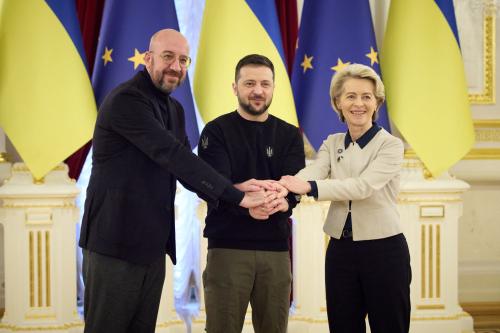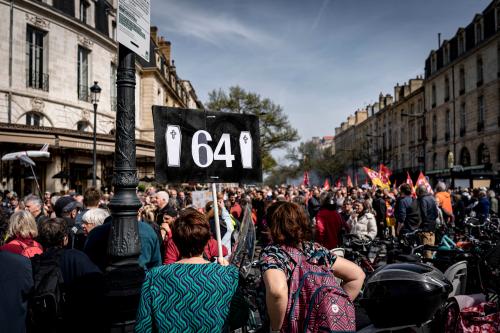Spain has just inaugurated a new government led by the Socialist Pedro Sánchez, making him only the second prime minister in Spain’s democratic history to obtain a third mandate, after his Socialist predecessor Felipe González did so in the 1990s. If Sánchez serves the full term, he will have governed Spain uninterruptedly from 2018 to 2027s. (Sánchez’s party PSOE calls itself “Socialist,” but it is situated on the center-left of the political spectrum and associates with the Social Democratic party family in Europe.) Very few would have predicted in 2018 that Spain was headed for a decade of social democratic rule.
However, the news these days is not about Spain’s socialist resilience, but rather about the set of agreements arrived at by Sánchez and his party to remain in power. Despite having come second in the July general elections, with 121 members of parliament compared to the conservative Popular Party’s 137, Sánchez managed to mobilize 179 votes for his investiture (needing 176). So, in the space of a couple of months, he managed to turn electoral defeat into parliamentary success. This was done after arriving at a coalition agreement with Sumar, a far-left bloc that includes the remnants of the left-wing populist party Podemos, and additional agreements with a collection of Galician, Basque, and Catalan nationalist parties.
A fragile partnership for Spain’s new government
Of all the MPs that supported Sánchez’s investiture on November 16, seven are of particular significance: those belonging to Junts, a conservative Catalan nationalist party, de facto led from Brussels by Carles Puigdemont. Junts has remained staunchly committed to Catalan independence from Spain, and its leadership, including Puigdemont, has faced prosecution from Spanish judges for its involvement in the procés — the 2014 to 2017 unilateral push for independence.
This set of events ended with the Spanish Senate suspending Catalan regional autonomy, and numerous Catalan leaders either in jail or in exile; Puigdemont himself (in)famously left for Marseille hidden in a car in October 2017. From there he moved to Brussels where he has been ever since. All the while, Spain’s justice system has pursued all available legal mechanisms to attain his extradition.
This complex set of events led to the July 2023 general elections, which had been preceded by a tense legislature with Sánchez at the helm and supported by Basque and Catalan nationalists. One of the latter, Esquerra Republicana de Catalunya (ERC), another pro-independence party, had decided to back Sánchez in 2019 in a policy shift. The ERC had effectively abandoned the unilateral route to Catalan independence in exchange for several concessions, including individual pardons for leaders of the procés and a direct dialogue on territorial issues with the central government.
So, by July 2023 it was only Junts that was left seeking a unilateral break away from Spain, in contravention of the Spanish Constitution. But the 2023 general election made Junts’ seven national MPs a fundamental element of any new government. Simply put, Sánchez could not be invested as prime minister without their active support. As soon as the election results came in, a flurry of informal and secretive meetings and conversations began in Brussels. No one wanted to be photographed talking to Puigdemont, formally a fugitive from justice. Puigdemont and his team, on the other hand, were very reluctant to be seen negotiating the formation of a Spanish government that they had spent the last decade denouncing.
Amnesty for Catalonia’s secessionists
The final deal was based on the approval of an amnesty law that would benefit around 300 pro-independence politicians and activists who participated in the 2014-2017 Catalan secession process, in exchange for Junts’ rejection of the unilateral route to independence, and its support for Sánchez as prime minister.
Critics of Sánchez point out that he actively rejected the possibility of an amnesty just days before the July 2023 elections, and that, hence, he lacks the democratic mandate to pursue it. Recent polling shows that a majority of Spaniards reject the project, and protests against the proposal and Spain’s new government have occurred in numerous Spanish cities.
The content of the political agreement between Junts and the Socialist Party has also received widespread criticism. Its preamble, in particular, has been polemical, with a description of the 2014-17 events that is tilted in favor of the pro-independence movement’s narrative. There is no reference made in that document, for example, to the internal fracture that the independence push caused within Catalonia itself, with many Catalans staunchly opposed to it.
A highly problematic reference to “lawfare” is also included in the agreement, hinting at a politicized judiciary in Spain that unduly persecuted pro-independence leaders. This reference has provoked strong reactions from some judge and state attorney associations in defense of their independence and impartiality. Lastly, many have questioned the lack of bipartisan support for a measure as significant as an amnesty, and, above all, the fact that its approval is fully dependent on the votes of those benefiting from it.
The Socialist Party, on the other hand, has argued that amnesties are common in Spanish history, as well as in similar countries, and that they do not constitute a breach of the separation of powers (as some have argued) but rather an exception to it that is contemplated in Spain’s Constitution. In any event, the debate around the measure’s constitutionality will surely be settled in the future because the Popular Party has announced that it will ask the Constitutional Court to review it.
Resetting politics in Catalonia
There are strong political arguments that are being put forward for this measure. First, that it allows Junts to follow the ERC and abandon its most radical positions, therefore, marking the true end of the procés. Second, that this process of dialogue with all major Catalan political parties might bring normality to Catalan political life. Indeed, one of the effects of Catalonia’s secessionist procés was to alter the region’s political axis to an independence vs. constitutionalism (or unionist) pivot.
This led Junts and the ERC to work together in pursuit of purely secessionist goals, despite both parties representing radically different electorates. It also meant that “constitutionalist” political forces were unable to secure majorities and were expelled from almost all the institutions in Catalonia. Hence, that level of polarization in the region led to consistent pro-independence statements and policies being put forward by those leading the institutions of government.
The current strategy — as outlined by now Prime Minister Sánchez — is to undo that axis, and to move Catalonia back to a left-right political pivot. This would benefit the region immensely as politicians would get back to governing rather than making grand but empty statements about statehood. It would also lead ERC and Junts to compete politically, rather than coalesce in a single front against “the central state,” and, more importantly, would enable the Socialist Party of Catalonia (PSC) to enter the political fray as a major player on the left of the spectrum.
This is all to say that Sánchez’s strategy of dialogue and negotiation would allow for the normalization of politics in Catalonia. That normalization and its electoral effects might be tested very soon as Catalonia is bound to head into regional elections in the next year or two.
Proof that this strategy is producing positive results would be the outcome of the July general elections for the PSC. The Catalan socialists obtained more votes in the region than the ERC and Junts put together. They were the most widely voted party in the four provinces of the region and added 19 MPs to the socialist group in the national parliament. Another element of proof would be the decline in support for independence in Catalonia. The latest report of the Catalan polling agency indicated that support for independence in the region is down to around 30%, the lowest figure since 2011.
An uncertain road ahead for Spain’s new government
Arguments about this entire process being a threat to Spanish democracy are overblown, as are comparisons to developments in Hungary and Poland. Spain is, in fact, one of the few full democracies in the world, with an effective separation of powers and an independent and competent judiciary.
Sánchez is, however, taking a big gamble. If his gamble does not pay off, he will have made major concessions to the pro-independence parties, weakened the state by legitimizing part of their narrative, deprived the government of necessary tools for responding to future attacks on the constitution, and perhaps further fueled the desire for independence in Catalonia. He will have also put his political future in the hands of a very unreliable set of partners, who will be necessary to pass national budgets and major pieces of legislation.
If the gamble does pay off, however, we might see a moderation of positions on the part of the ERC and Junts, maybe a socialist-led government in Catalonia in the next 24 months, and a consistent decline in support for Catalan independence. So, the current set of events could simply be another phase in the procés, or a major step toward its definitive end.
The Brookings Institution is committed to quality, independence, and impact.
We are supported by a diverse array of funders. In line with our values and policies, each Brookings publication represents the sole views of its author(s).








Commentary
Dancing with separatists: Can Spain’s new government last?
November 22, 2023